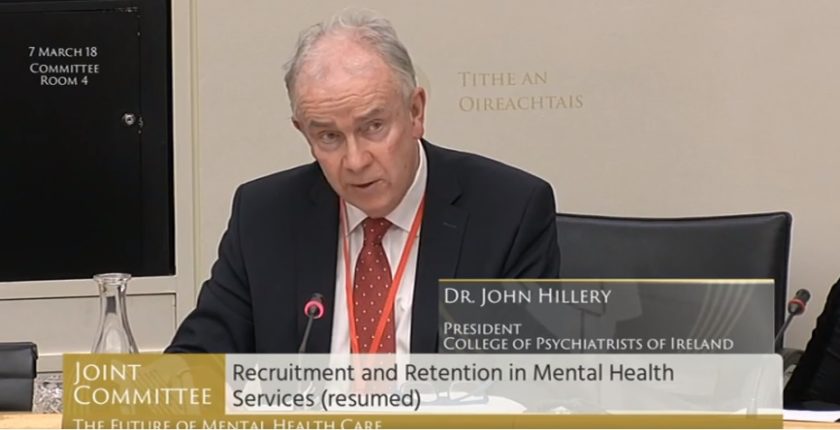Blog
Press Statement: Committee on Future of Mental Health Care told psychiatrist posts in Ireland currently at 50% below the required amount: High trainee satisfaction levels yet low take up in posts here
- March 9, 2018
- Category: Blog External Affairs & Policy Government Policy Press Statements Stakeholders Uncategorized

President of the College of Psychiatrists of Ireland, Dr John Hillery, addressed the Joint Oireachtas Committee on Future of Mental care on Wednesday 7th March 2018, on the issue of recruitment and retention of psychiatrists and trainee psychiatrists to Mental Health Services.
The Committee heard that Ireland ranks behind most other European countries (17th out of 26) with Consultant Psychiatrist numbers amounting to 8 per 100,000. In order to achieve a Consultant-delivered service in all areas of Psychiatry, the College believes that there needs to be a doubling of current Consultant psychiatrist numbers to 800 posts nationally, which equates to 16 per 100,000 people. This would allow for the increasing clinical demand for services annually and the multitude of non-clinical activities now expected of specialist consultants such as administration, training, examining and continuing professional development. It would also mitigate other factors currently impeding proper service delivery such as holiday leave, sick leave, maternity and parental leave as well as addressing the unacceptable pattern in recent years of patients having to see a different registrar at each appointment.
Dr Hillery said the College has closely examined the factors adversely affecting recruitment and retention to psychiatry in Ireland, and adapted its training to maximise its attraction for trainees. As a result, the trainee experience in psychiatry is highly positive as evidenced by the annual Medical Council survey which for 2 years running has seen psychiatry scoring highest of all 13 training bodies – with a particularly high sub-score for supervision, assessment, and feedback.
Dr Hillery said,
“Regrettably we still face significant challenges when it comes to both filling training posts in Psychiatry and also in getting specialists to stay and fill Consultant posts. This is an issue across medicine in Ireland. We know a high percentage of new medical graduates intend to go overseas drawn by a multitude of factors including a search for adventure; peer pressure; perception of better working conditions in some accessible countries; perception of better career opportunities in some accessible countries matched by a perception of poor health service conditions and career opportunities in our own country”
There are several reports in recent years, Dr Hillery pointed out, that have examined the generic issues involved and proposed remedies. These include the McCraith Report and the recent report on Consultant Recruitment and Retention published by the HSE.
Continuing, Dr Hillery explained,
It is hard to work out why many of the simple recommendations in these reports remain unimplemented as they have been well enunciated for many years. Our own trainees cite poor resources and inadequate budgets in mental health services as well as reduced remuneration compared to other countries, as reasons for leaving Irish Psychiatry.
The College has consistently called for mental health services in Ireland based on a philosophy of recovery and a system which ensures access to assessment and intervention with an appropriate menu of treatment options available to patients based on clinical need, not geography or ability to pay. This requires financial, structural and cultural change on the part of policy makers and the national service provider.”
Dr Hillery highlighted some of the proposals to address the recruitment and retention problems such as:
- Lifting the barriers to training posts in psychiatry
- Remuneration
- Streamlining process of creation and replacement of consultant posts
- An integrated IT system
- The primacy of teaching, training and research to be reinstated within the profession of psychiatry to ensure MDTs maintain and attract highly qualified professionals.
- Developing a culture in our health services where trainees and consultants feel respected
